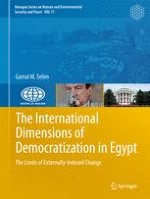2015 | OriginalPaper | Buchkapitel
8. Egypt and the Cross-National Diffusion of Democratic Experiences
verfasst von : Gamal M. Selim
Erschienen in: The International Dimensions of Democratization in Egypt
Aktivieren Sie unsere intelligente Suche, um passende Fachinhalte oder Patente zu finden.
Wählen Sie Textabschnitte aus um mit Künstlicher Intelligenz passenden Patente zu finden. powered by
Markieren Sie Textabschnitte, um KI-gestützt weitere passende Inhalte zu finden. powered by
